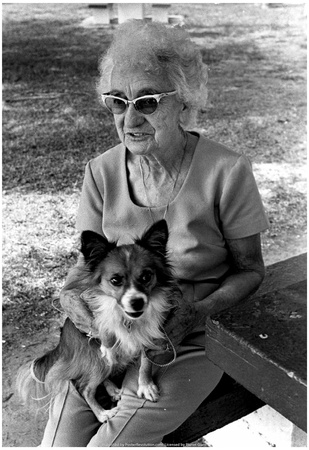Many elderly people grew up having dogs and don't really want to give up the companionship and love that a dog brings into their lives. Yet it can be difficult for someone who might have mobility problems or other issues to deal with a dog. Here are some suggestions for deciding on a large or small dog for a senior citizen.

Dogs for Senior Citizens
by Ragtimelil
Studies have shown that seniors with pets have better physical and mental health, live longer and deal better with stress. Here are some suggestions for dogs for seniors.
Small Dogs
Toy breeds have long been a favorite of older citizens. They have the advantage of their small size and portability. They are not likely to knock someone down and they do fit comfortably in a lap or snuggled up in the bed. They are also easy to exercise since a game of fetch doesn't require as much running space and they can be exercised in the house.
When choosing a small breed, you might want to consider the amount of grooming the dog will need. A Lhasa Apso must have regular grooming while a Chihuahua is very low maintenance. If the dog will be living in an apartment, consider the noise level of the dog. Some terriers are noted for being very noisy while other breeds are quieter. Of course, all dogs can bark and all dogs need to be trained to be quiet on command.
Of course a pet doesn't have to be a purebred. Many toy dogs are waiting for homes in shelters and rescue organizations. Still, it's often helpful to know something about the makeup of the dog if at all possible. No matter what the size of the dog, doing research into the characteristics of the breeds is always a good idea.
Litter Box Training
Another advantage to the small dogs is that they can be litter box trained. This is a real advantage for someone who isn't able to walk the dog or doesn't have a fenced yard.
Small dogs have small bladders and intestines, yet they have to eat more for their size than their larger cousins. This means they may have to go more often than a larger dog. A litter box eliminates the need to take the dog out in all sorts of weather several times a day.
Litter box training is as simple as paper training. If the dog is already paper trained, it makes it even easier. You can use a large cat litter box or use one made for dogs. Since dogs don't bury their waste, you don't need to use cat litter, which may stick to their coat and paws. Use litter made for dogs or just shredded newspaper. Don't put the box near their food and water. Keep it on an easy to clean surface.
You will need to train the dog to step into the litter box. You can make a game out of it and train them to "get in the box" using a treat or reward. Take a scrap of paper soaked with the dog's urine and place it under the litter. The scent will help give the dog the idea of what's expected.
Like any method of housebreaking, keep the dog right with you or in the box area until he gets the idea. Use lots of praise when the dog does go in the box.
Medium and Large Dogs
There are also advantages to larger dogs. They can be trained to help the owner with all sorts of tasks, even to standing still and acting as a support for someone getting up on their feet. Some service dogs even can pull someone in a wheel chair. They offer some security and protection with a deeper bark and larger size.
Along with smaller, medium sized dogs, they can also be trained to retrieve objects like a phone or a remote. Some service dogs even learn to push a programmed button that will dial an emergency number.
 | Teamwork, Book 1, Revised & Expanded Edition The hope is that more and more people with disabilities will realize that they can share the companionship and joy of owning a dog, and with a little work and dedication, they c... |
 | Teamwork II: A Dog Training Manual for People with Disabilities TEAMWORK II is a dog training manual written for people with disabilities to be able to train their own dogs to assist them in their daily lives. TEAMWORK I teaches basic obedie... |
 | Working Like Dogs: The Service Dog Guidebook Working Like Dogs: The Service Dog Guidebook is the resource book for service dogs that captures personal stories, checklists and practical tips to provide the reader with an A-... |
Selecting a Dog
Larger dogs need to be carefully chosen for calmness and gentleness. It really is a matter of the individual rather than the breed although some active breeds probably aren't going to be the first choice for someone who might be unsteady on their feet. Many service dogs are actually selected from shelters for their gentle and calm natures.
Trainers who select dogs for work as service dogs screen them by using tests very similar to the TT or Temperament Test. They are exposed to loud noises, sudden movements like an opening umbrella, engaged in play, and walked by other dogs. The dogs that startle but recover, show no aggression to other dogs and are more interested in the trainer than exploring are the ones selected for training as a service dog. There is a good outline on testing here, Selecting Service Dogs.This could be a useful guide in selecting a dog for an elderly person as well.
Services for Elders with Pets
Some seniors are concerned that they may not have the resources to care for a pet. Many communities now are recognizing how much a pet can contribute to the the quality of life of a senior citizen. Studies have shown that the elderly with pets are more active, alert and healthier than those without. Pets can even be a buffer against depression.
One example of how the community is helping seniors keep pets is the web site Pets and the Elderly. They list everything from discounted pet care to animal meals on wheels. Some shelters are helping by offering a discount when placing an older dog with an older person. If your area doesn't have these services, maybe it would be a good thing to start
 | Secrets of a Vet Tech: The Guide to Low Cost Pet Care when the Cupboard is Bare In this book, J.C. Farris reveals how to take care of your pet when finances are a huge concern. A vet tech caring for 25 of her own rescue animals, she chronicles all her knowl... |
You might also like
What is a Well Behaved Dog?Dogs can be well behaved if the are trained. Here's what you should expect yo...
Five Ways that Therapy Dogs Make the World a Better PlaceMost people are familiar with the image of an assistance dog at the side of a...












 How I Found My Free Family History Programon 09/05/2013
How I Found My Free Family History Programon 09/05/2013
 Finding a Graveon 09/01/2013
Finding a Graveon 09/01/2013
 Do Border Collies Make Good Pets?on 08/11/2013
Do Border Collies Make Good Pets?on 08/11/2013
 Hubert Patey - an Indentured Servanton 08/02/2013
Hubert Patey - an Indentured Servanton 08/02/2013



Comments on Dogs for the Elderly
Yes, having a companion cat or dog in your later years is such a good idea!
It's true that little dogs are easier to manage.
I think the little dogs work best for the elderly. Great post.
You are probably right. I live alone except for my dogs and I know I'd be lost without something to take care of. It gets me out for a walk too.
I believe having a dog to care for it what helped keep my grandmothers around long after my grandfathers were gone. I see seniors in nursing homes just light up with delight when they get to hold a dog in their laps. Something to love, easy to care for, if they still can, go for it.
You are absolutely right. Thanks for adding that.